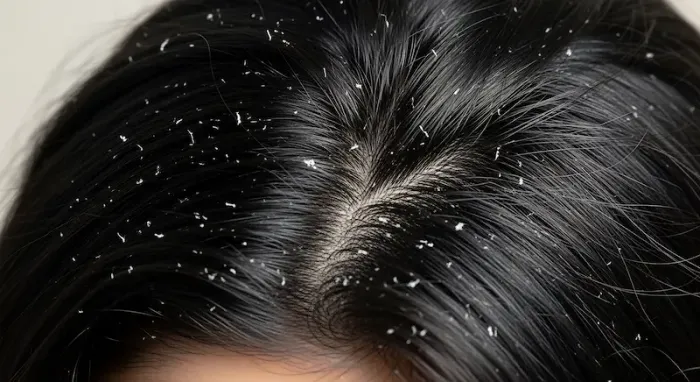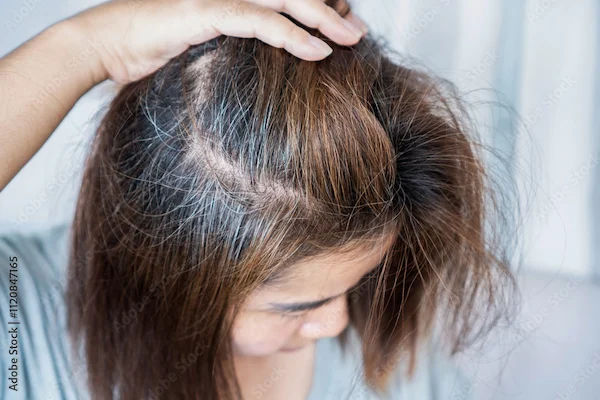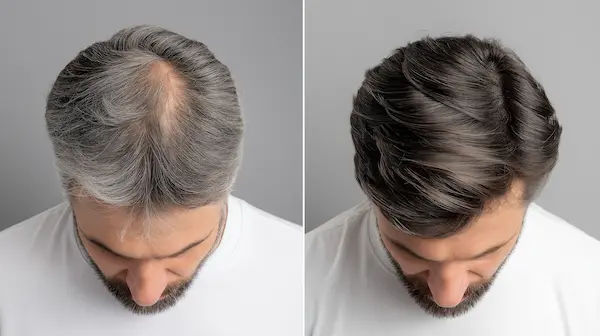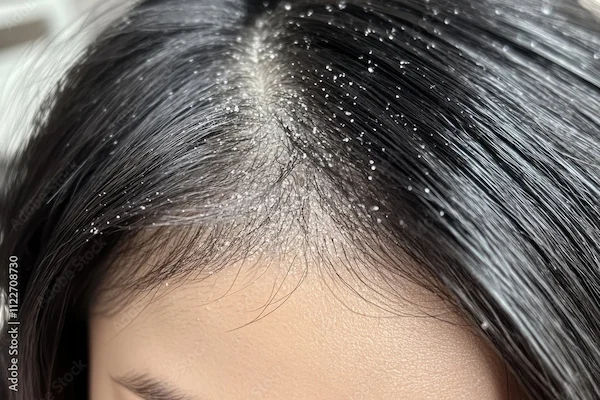Natural Treatments For Dandruff
Explore effective natural treatments for dandruff to reduce flakes, soothe scalp irritation, and promote healthier hair naturally at home.

Written by Dr. J T Hema Pratima
Reviewed by Dr. Dhankecha Mayank Dineshbhai MBBS
Last updated on 13th Jan, 2026

Introduction
Tired of the white flakes on your shoulders and the relentless itch on your scalp? You're not alone. Dandruff is a common, often frustrating condition that affects nearly half of the adult population. While medicated shampoos are a go-to solution, they can sometimes be harsh, leading to dryness, irritation, or simply losing their effectiveness over time. This has led many to seek gentler, more sustainable alternatives from nature's own pharmacy. This comprehensive guide will explore the most effective natural treatments for dandruff, diving into the science behind why they work, how to use them safely, and how to integrate them into a holistic haircare routine. We'll move beyond quick fixes and empower you with knowledge to achieve a healthier, flake-free scalp for the long term.
Understanding Dandruff: More Than Just Dry Skin
Before we treat it, we must understand it. Dandruff is often mistakenly attributed to simple dryness, but its causes are more complex.
What Really Causes Dandruff?
The primary culprit behind most dandruff is a naturally occurring microbe on our scalps: a yeast-like fungus called Malassezia globosa. For most people, it's harmless. However, in some individuals, the scalp reacts to its byproducts, triggering irritation. This reaction causes skin cells to multiply and shed at an accelerated rate, leading to the visible flakes we recognize as dandruff. Other contributing factors include:
• Seborrheic dermatitis: A more severe form of oily, flaky skin.
• Sensitivity to haircare products (contact dermatitis): Reactions to certain chemicals, fragrances, or preservatives.
• Dry skin: Simple dryness can cause smaller, less oily flakes.
• Diet and stress: While not direct causes, they can exacerbate the condition.
Consult a Dermatologist for the best advice
Top Natural Remedies for a Flake-Free Scalp
Nature offers a powerful arsenal against dandruff. These remedies often work by targeting the root causes: fungus, inflammation, and excess oil.
1. Apple Cider Vinegar (ACV): The pH Balancer
Apple cider vinegar is a superstar in the world of natural health, and for good reason. Its acidity helps to correct the pH balance of your scalp, creating an environment where the Malassezia fungus struggles to thrive.
How to Use It:
1. Mix one part raw, unfiltered ACV with two parts warm water.
2. After shampooing, pour the mixture over your scalp, massaging gently.
3. Let it sit for 2-5 minutes, then rinse thoroughly.
4. Start with once a week and adjust as needed.
Pro Tip: Always dilute ACV to avoid chemical burns or further irritation. Its antimicrobial properties make it a powerful ally in your fight against scalp fungus.
2. Coconut Oil: The Moisturising Antimicrobial
Coconut oil is a triple threat: it moisturises dry skin, reduces inflammation, and contains potent antimicrobial agents like lauric acid, which has been shown to fight fungal strains.
How to Use It:
1. Warm a small amount of virgin coconut oil in your hands.
2. Massage it directly into your scalp and through your hair.
3. Leave it on for at least 30 minutes, or even overnight for a deep treatment.
4. Shampoo twice to remove all the oil.
Note: If your dandruff is primarily due to oily skin (seborrheic dermatitis), a heavy oil treatment might not be suitable. Opt for a lighter oil like jojoba.
3. Tea Tree Oil: Nature's Antifungal
Tea tree oil is one of the most well-researched essential oils for dandruff. Its powerful antifungal and anti-inflammatory properties directly target the Malassezia yeast and calm the associated redness and itching.
How to Use It:
1. Never apply pure tea tree oil directly to your scalp. Always dilute it.
2. Add 10-15 drops of tea tree oil to your regular amount of shampoo. Lather and leave on for 5 minutes before rinsing.
3. Alternatively, mix 5 drops with a tablespoon of a carrier oil (like jojoba or coconut) for a pre-shampoo treatment.
4. Aloe Vera: The Soothing Healer
Known for its incredible soothing properties, aloe vera gel is excellent for calming an inflamed, itchy scalp. It also possesses mild antifungal qualities and provides hydration without heaviness.
How to Use It:
1. Extract fresh gel from an aloe leaf or use a pure, store-bought gel (check for additives).
2. Apply the cool gel directly to your scalp.
3. Leave it on for 15-30 minutes before washing your hair as usual.
Dietary and Lifestyle Changes for Scalp Health
What you put in your body is just as important as what you put on it. A holistic approach can significantly improve your results.
1. Foods to Fight Dandruff
Your diet can influence oil production and inflammation. Incorporate these:
• Omega-3 Fatty Acids: Found in fatty fish (salmon, mackerel), flaxseeds, and walnuts, they reduce inflammation throughout the body, including the scalp.
• Zinc-Rich Foods: Zinc regulates oil production and cell growth. Find it in legumes, nuts, seeds, and whole grains.
• B Vitamins: Essential for skin health. Biotin (B7) and Niacin (B3) are particularly important. Eat eggs, avocados, and leafy greens.
• Probiotics: Found in yoghurt, kefir, and fermented foods, they support a healthy gut microbiome, which is linked to reduced inflammation and a stronger immune response.
2. The Impact of Stress Management
Stress is a known trigger for flaring skin conditions, including dandruff. High stress levels can weaken your immune system, making it harder for your body to keep the Malassezia population in check. Incorporating stress-reduction techniques like yoga, meditation, regular exercise, or even just ensuring you get enough sleep can have a noticeable impact on your scalp's health.
Building Your Natural Anti-Dandruff Hair Care Routine
Consistency is key. A one-off treatment won't cure chronic dandruff. Here’s how to build a sustainable routine.
A Sample Weekly Routine
Day 1: Wash hair with a gentle, natural shampoo. Follow with an ACV rinse.
Day 3: Wash hair as normal.
Day 5: Apply a tea-tree-oil-enriched shampoo treatment. Leave on for 5 mins.
Day 7: Perform a coconut oil or aloe vera pre-shampoo treatment.
What to Avoid in Your Hair Products
Many commercial products contain ingredients that can strip the scalp and worsen irritation. Be wary of:
• Sulphates (SLS/SLES): Harsh detergents that can strip natural oils, causing dryness and irritation.
• Silicones: They can build up on the scalp and hair, trapping debris and potentially clogging follicles.
• Parabens and Synthetic Fragrances: Common irritants that can trigger allergic reactions and inflammation.
When to See a Doctor
While natural remedies for scalp buildup are effective for many, they are not a substitute for professional medical advice. Consult a dermatologist if:
• Your symptoms are severe, painful, or causing bleeding.
• You see signs of infection (yellow crust, extreme redness).
• The natural treatments show no improvement after 4-6 weeks of consistent use.
• The condition spreads to your face or other parts of your body.
You may be dealing with a more serious condition like psoriasis or a severe fungal infection that requires prescription-strength treatment.
Conclusion
Achieving a healthy, dandruff-free scalp is a journey of understanding your body and finding the right balance. Natural dandruff treatments like apple cider vinegar, tea tree oil, and coconut oil offer powerful, gentle alternatives to chemical-laden products, targeting the root causes of fungus, inflammation, and imbalance. By combining these topical solutions with internal support from a nutrient-rich diet and effective stress management, you can create a comprehensive strategy for long-term scalp health. Remember, patience and consistency are your greatest allies. Start with one remedy, listen to how your scalp responds, and build a routine that brings you confidence and comfort.
Consult a Dermatologist for the best advice
Consult a Dermatologist for the best advice

Dr. D M Mahajan
Dermatologist
35 Years • MBBS, MD (Dermatology)
Delhi
Apollo Hospitals Indraprastha, Delhi
(200+ Patients)

Dr. Padmavathy M
Dermatologist
10 Years • MD.,(DVL ) F.C.D.
Madurai
Apollo Speciality Hospitals KK Nagar, Madurai
(275+ Patients)

Dr. Yogesh H R
Dermatologist
21 Years • MBBS, MD
Bengaluru
Apollo Hospitals Jayanagar, Bengaluru

Dr. K Chetana
Dermatologist
10 Years • MBBS, MD ( Dermatology)
Hyderabad
Apollo 24|7 Clinic, Hyderabad

Dr Gayatri Rajesh
Dermatologist
12 Years • MBBS., DDVL
Chennai
Apollo Medical Centre Kotturpuram, Chennai
Consult a Dermatologist for the best advice

Dr. D M Mahajan
Dermatologist
35 Years • MBBS, MD (Dermatology)
Delhi
Apollo Hospitals Indraprastha, Delhi
(200+ Patients)

Dr. Padmavathy M
Dermatologist
10 Years • MD.,(DVL ) F.C.D.
Madurai
Apollo Speciality Hospitals KK Nagar, Madurai
(275+ Patients)

Dr. Yogesh H R
Dermatologist
21 Years • MBBS, MD
Bengaluru
Apollo Hospitals Jayanagar, Bengaluru

Dr. K Chetana
Dermatologist
10 Years • MBBS, MD ( Dermatology)
Hyderabad
Apollo 24|7 Clinic, Hyderabad

Dr Gayatri Rajesh
Dermatologist
12 Years • MBBS., DDVL
Chennai
Apollo Medical Centre Kotturpuram, Chennai



